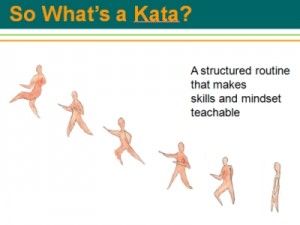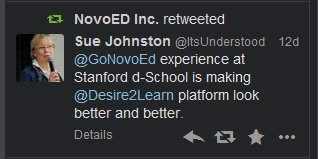by Susan Johnston | Jan 24, 2014 | Build your own skills, Get people talking |
 SCARF is a concept developed by David Rock of the NeuroLeadership Institute and popularized in his book, Quiet Leadership. It’s a good way to take stress out of a conversation. That’s useful, since a person in stress doesn’t think clearly.Sometimes, our brain is not our friend.
SCARF is a concept developed by David Rock of the NeuroLeadership Institute and popularized in his book, Quiet Leadership. It’s a good way to take stress out of a conversation. That’s useful, since a person in stress doesn’t think clearly.Sometimes, our brain is not our friend.
There’s a busy and primitive part of it, the amygdala, always scanning for changes in the environment. It interprets all change or discomfort as danger, which made sense when the User Guide for Life  was: “Eat or be eaten.” When the part of the brain concerned with survival takes over, the “fight or flight” mechanism kicks in automatically. The part of the brain that processes information and makes decisions is all but shut down as the body involuntarily prepares for trouble.
was: “Eat or be eaten.” When the part of the brain concerned with survival takes over, the “fight or flight” mechanism kicks in automatically. The part of the brain that processes information and makes decisions is all but shut down as the body involuntarily prepares for trouble.
The theory suggests there are five elements of a relationship or situation that can derail any conversation if they are missing or out of balance. The more we can do to provide them, the more likely the other person is to feel safe in the conversation and able to think clearly.
You won’t be surprised to learn that SCARF is an acronym.
STATUS – “Where am I in the pecking order?” Our brains are always on the lookout for evidence of where we sit regarding power, authority and influence. That’s residue from an earlier time, one that held greater risk of getting clobbered. We feel safer when we sense that our status is equal to or greater than the folks around us. Neuroscience suggests that our brains react to a threat to our status the same way they do to a physical threat. The brain doesn’t differentiate. So if you “outrank” the person you’re talking with – you’re their boss, professor, parent, etc. – the very fact of talking with you is stressful because your status is higher than theirs.
What can we do to balance the status? Recognizing the gap is the first step. You might move the meeting from your office to a neutral place or a place where they are comfortable. A conference room, a cafe, their office or go for a walk. You might draw their attention to a fact that raises their status. “I need to talk with you because you have experience with this project.” “Your job gives you a closer look at [whatever], so I value your thoughts.” “As a member of this team, your work is important to our success.” Make it something real – they’ll smell inauthenticity.
(more…)
by Susan Johnston | Jan 24, 2014 | Build your own skills |
 Holding a good conversation is the best way to instigate change for the better. People hear what’s going on, issues are aired, confusion is cleared up, everyone goes away happy, and change goes smoothly.
Holding a good conversation is the best way to instigate change for the better. People hear what’s going on, issues are aired, confusion is cleared up, everyone goes away happy, and change goes smoothly.
On what planet?
While humans are naturally wired to communicate, we’re not all set up to do it well. You don’t have to look very far to find an example of miscommunication that leads to waste – wasted time, wasted effort, wasted energy, wasted goodwill.
Fortunately, there are some key behaviours we can learn and practise that will increase the chance that our communications will be heard, understood and acted on. We call these “Communication Kata.” They’re named after the exercises practitioners of martial arts, such as Aikido and Kung Fu, repeat, over and over, until they become instantly available to them when needed. They don’t have to think, “Now I move my right hand here and raise my left foot so many inches.” They focus on strategy. “Now I kick my opponent in the back.”
Similarly, learning and practising these communication kata makes these techniqes of effective interaction available whenever you’re in conversation. You don’t need to think about the process, you can focus on the content. Think of it as “Tongue Fu.”
We’ve presented these Communication Kata at conferences (Agile 2013 and Agile Tour Montreal). By popular request, we share them here on the blog.
Communication Kata 1: SCARF
Communication Kata 2: Share your intention
by Susan Johnston | Aug 21, 2013 | Uncategorized |
Once in a while, if you are very lucky, you get a gigantic dose of brain candy. That was my experience at Agile 2013, a five-day gathering of smart and thoughtful individuals working to find new ways to work, particularly in the realm of software development.
This was an enormous conference, twice as large as anything I’d been to and twice as long. There were more than 1,700 people registered for five days of non-stop idea sharing. In every time slot, there were over a dozen sessions to choose from. That didn’t count the unscheduled ‘open jam’ sessions and lively discussions during the breaks.
 And don’t forget the parties. We were, after all, in Nashville. Music City. Honky Tonk Heaven.
And don’t forget the parties. We were, after all, in Nashville. Music City. Honky Tonk Heaven.
It took place in a hotel that could pass for an amusement park. The Gaylord Opryland Conference Center is a massive biodome-like structure with islands, rivers, jungles and other distractions. Rooms are in at least five distinct buildings connected by meandering paths on several levels. It’s one thing to be lost in a new city. But to be lost in your own hotel? Every five minutes? Our hotel map would prove to be as important as our room keys.
This could have been a ticket to overwhelm. Instead, it was a most exquisite learning experience. Inspired by the Agile Manifesto, this is a community that spends its days promoting collaboration, pairing discipline with creativity, trying to create more people-centric work situations, and learning.
So what did I take away from this adventure that might be useful for readers of this blog? (more…)
by Susan Johnston | Aug 12, 2013 | Rants, Ramblings and Riddles |
I recently posted: “Google before you Tweet” is the new “Think before you Speak.” Since things posted on the Internet are forever, I thought I’d remind myself and others that it’s good to verify your information before pontificating. (I have snopes.com on speed dial.)
The same is true for reading the content before we share on facebook or retweet a link. Actually reading and checking what we post can preserve the illusion that we are intelligent beings. Otherwise we risk sharing something incorrect or inappropriate or pass on, as truth, satire from The Onion or Mooscleans.
Being asle ep at the wheel when you are posting as yourself is merely embarrassing. But when you’re posting on behalf of an organization, it’s criminal not to have your brain in gear. So I was puzzled, today, to see a retweet of something I posted a couple of weeks ago.
ep at the wheel when you are posting as yourself is merely embarrassing. But when you’re posting on behalf of an organization, it’s criminal not to have your brain in gear. So I was puzzled, today, to see a retweet of something I posted a couple of weeks ago.
Is this an organization rubbishing itself? Or is someone simply not reading and thinking before posting?
NovoED is the learning platform for an online course I’m taking. (A MOOC with thousands of participants.) Desire2Learn, based in my community, would seem to be a rival in the ed-tech space. (Yes, I Googled that before pontificating.) So why would NovoED repeat a plug for D2L?
(more…)
by Susan Johnston | Jul 20, 2013 | Build your own skills |
How to prevent the over-commitment that leads to overwhelm
This article first appeared in our newsletter in 2003. Still true!

“No!”
It’s a small yet powerful word, one with big consequences. It’s a word that can improve our lives and make us more valuable to those we say it to – those we want to help in this world.
At the end of a week in which I – and the feelings I was experiencing – seemed to be on a non-stop rush from appointment to commitment to obligation to ordeal, I stopped to reflect on what was making me feel so beleaguered.
I examined my “To Do” list, and highlighted the things I really wanted to do. Almost all the highlighted items had fallen (or were they pushed?) to the bottom of the page. Activities that were important to me had, for months, languished, ignored and forgotten, beneath activities that other people wanted me to do. Ouch!
It had something to do with my reluctance to use the word “No.” A little reading and a lot of reflection showed me:
- That NO is not a dirty word
- How to say NO without feeling guilty
- And why saying NO increases the value of the things we say YES to.
How does it happen?
(more…)
by Susan Johnston | Jul 14, 2013 | Uncategorized |
 “She gets up and pours herself a strong one & stares out at the stars up in the sky – then takes a taxi because she doesn’t drive impaired.”
“She gets up and pours herself a strong one & stares out at the stars up in the sky – then takes a taxi because she doesn’t drive impaired.”
That’s just one of many tweets posted by the Royal Canadian Mounted Police in Newfoundland (@RCMPNL) on July 13, when The Eagles were headlining at the annual Salmon Festival. An outdoor party featuring five big name bands is bound to attract an exuberant and boisterous crowd – some of whom might have their wits dipped in alcohol.
Rather than get all preachy-teachy on the subject of driving safely, the Mounties took their message – and a sense of humour – to Twitter. They cleverly wrapped their message in lyrics from Eagles hits. Here are just a few.
- “Already Gone” to see the Eagles at the Salmon Festival? Traffic is heavy. Take your time. RCMP members are patrolling the TCH. [Trans Canada Highway]
- Keeping some “Fast Company” on your way to see The Eagles at Salmon Festival? RCMP members will be watching for speeders. Take your time.
- It’s going to be a “Heartache Tonight” if the RCMP pulls you over for impaired driving at Salmon Festival. Designate a driver.
- “You can’t hide your lyin’ eyes” If you’re driving impaired at Salmon Festival the RCMP will find you.
- Jail is no “Hotel California” Enjoying Salmon Festival? Designate a driver, take a taxi or walk. Don’t drink& drive. (more…)
 SCARF is a concept developed by David Rock of the NeuroLeadership Institute and popularized in his book, Quiet Leadership. It’s a good way to take stress out of a conversation. That’s useful, since a person in stress doesn’t think clearly.Sometimes, our brain is not our friend.
SCARF is a concept developed by David Rock of the NeuroLeadership Institute and popularized in his book, Quiet Leadership. It’s a good way to take stress out of a conversation. That’s useful, since a person in stress doesn’t think clearly.Sometimes, our brain is not our friend. was: “Eat or be eaten.” When the part of the brain concerned with survival takes over, the “fight or flight” mechanism kicks in automatically. The part of the brain that processes information and makes decisions is all but shut down as the body involuntarily prepares for trouble.
was: “Eat or be eaten.” When the part of the brain concerned with survival takes over, the “fight or flight” mechanism kicks in automatically. The part of the brain that processes information and makes decisions is all but shut down as the body involuntarily prepares for trouble.




